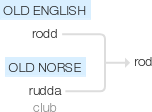Rod
late Old English rodd ‘slender shoot growing on or cut from a tree’, also ‘straight stick or bundle of twigs used to inflict punishment’; probably related to Old Norse rudda ‘club’.
wiktionary
From Middle English rodde, from Old English *rodd or *rodde (attested in dative plural roddum(“rod, pole”)), of uncertain origin, but probably from Proto-Germanic *rudd-(“stick, club”), from Proto-Indo-European *rewdʰ-(“to clear land”). Compare Old Norse rudda(“club”). For the root, compare English rid. Presumably unrelated to Proto-Germanic *rōdō(“rod, pole”).
etymonline
rod (n.)
Middle English rod, rodde, "a stick of wood," especially a straight cutting from a woody plant, stripped of twigs, and having a particular purpose" (walking stick, wand of office, instrument of punishment), from Old English rodd "a rod, pole," which is probably cognate with Old Norse rudda "club," from Proto-Germanic *rudd- "stick, club," from PIE *reudh- "to clear land." Other sources formerly consider it to correspond to the continental words under rood.
As a long, tapering elastic pole for fishing, from mid-15c. Figurative sense of "offshoot" (mid-15c.) led to Biblical meaning "scion, tribe." As an instrument of punishment, attested from mid-12c.; also used figuratively for "any sort of correction or punishment" (14c.). In mechanics, "any bar slender in proportion to its length" (1728).
As a unit of linear measure (5½ yards or 16½ feet, also called perch or pole) attested from late 14c., from the pole used to mark it off. As a measure of land area, "a square perch," from late 14c., the usual measure in brickwork. Meaning "light-sensitive cell in a retina" is by 1837, so-called for their shape. Slang meaning "penis" is recorded from 1902; that of "handgun, pistol, revolver" is by 1903.
